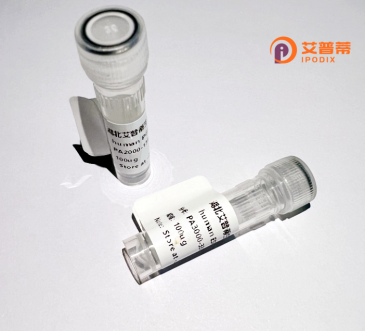
| 纯度 | >90%SDS-PAGE. |
| 种属 | Human |
| 靶点 | DUSP4 |
| Uniprot No | Q13115 |
| 内毒素 | < 0.01EU/μg |
| 表达宿主 | E.coli |
| 表达区间 | 1-394aa |
| 氨基酸序列 | MVTMEELREMDCSVLKRLMNRDENGGGAGGSGSHGTLGLPSGGKCLLLDCRPFLAHSAGYILGSVNVRCNTIVRRRAKGSVSLEQILPAEEEVRARLRSGLYSAVIVYDERSPRAESLREDSTVSLVVQALRRNAERTDICLLKGGYERFSSEYPEFCSKTKALAAIPPPVPPSATEPLDLGCSSCGTPLHDQGGPVEILPFLYLGSAYHAARRDMLDALGITALLNVSSDCPNHFEGHYQYKCIPVEDNHKADISSWFMEAIEYIDAVKDCRGRVLVHCQAGISRSATICLAYLMMKKRVRLEEAFEFVKQRRSIISPNFSFMGQLLQFESQVLATSCAAEAASPSGPLRERGKTPATPTSQFVFSFPVSVGVHSAPSSLPYLHSPITTSPSC |
| 分子量 | 49.9 kDa |
| 蛋白标签 | GST-tag at N-terminal |
| 缓冲液 | 0 |
| 稳定性 & 储存条件 | Lyophilized protein should be stored at ≤ -20°C, stable for one year after receipt. Reconstituted protein solution can be stored at 2-8°C for 2-7 days. Aliquots of reconstituted samples are stable at ≤ -20°C for 3 months. |
| 复溶 | Always centrifuge tubes before opening.Do not mix by vortex or pipetting. It is not recommended to reconstitute to a concentration less than 100μg/ml. Dissolve the lyophilized protein in distilled water. Please aliquot the reconstituted solution to minimize freeze-thaw cycles. |
以下是关于重组人DUSP4蛋白的3篇参考文献及其摘要简述:
1. **"Dual-specificity phosphatase 4 regulates vascular endothelial growth factor-induced angiogenesis"**
- **作者**: Yang J et al.
- **摘要**: 该研究报道重组人DUSP4通过抑制ERK/MAPK信号通路调控血管内皮生长因子(VEGF)诱导的血管生成,提示其在抗血管生成治疗中的潜在作用。
2. **"Structural and functional characterization of human DUSP4 phosphatase domain"**
- **作者**: Chen X et al.
- **摘要**: 通过重组表达人DUSP4磷酸酶结构域,阐明了其晶体结构及与底物p38 MAPK的结合机制,揭示了DUSP4催化活性及选择性调控MAPK信号的分子基础。
3. **"DUSP4 suppresses breast cancer progression by restraining mTORC1 signaling"**
- **作者**: Wang L et al.
- **摘要**: 研究发现重组人DUSP4通过抑制mTORC1通路活性,降低乳腺癌细胞增殖和转移能力,提示其作为肿瘤抑制因子的潜在治疗价值。
4. **"DUSP4 modulates the DNA damage response through dephosphorylation of H2AX"**
- **作者**: Patel R et al.
- **摘要**: 该文证明重组人DUSP4通过去磷酸化H2AX参与DNA损伤修复调控,揭示其维持基因组稳定性的新功能,并提示其与化疗耐药性的关联。
Recombinant human DUSP4 (dual-specificity phosphatase 4), also known as MKP-2. is a protein encoded by the DUSP4 gene and belongs to the dual-specificity phosphatase family. It plays a critical role in regulating mitogen-activated protein kinase (MAPK) signaling pathways by dephosphorylating both tyrosine and serine/threonine residues on target kinases, including ERK, JNK, and p38. DUSP4 acts as a negative feedback regulator to control cellular responses to growth factors, stress, and inflammatory cytokines, thereby influencing cell proliferation, differentiation, apoptosis, and immune responses. Dysregulation of DUSP4 expression has been implicated in various diseases, including cancer, neurodegenerative disorders, and autoimmune conditions. Recombinant DUSP4 protein is typically produced using expression systems like Escherichia coli or mammalian cells, enabling researchers to study its enzymatic activity, structural properties, and interactions with signaling partners. Its applications extend to investigating MAPK pathway dynamics, screening for therapeutic agents targeting phosphatase activity, and exploring mechanisms underlying disease pathogenesis. The development of recombinant DUSP4 facilitates both basic research and drug discovery efforts aimed at modulating kinase-driven signaling cascades.
×